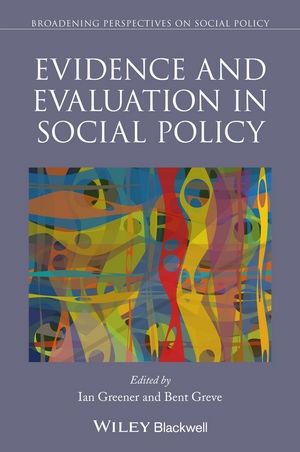Read more
Evidence and Evaluation in Social Policy examines the role of evidence in social policymaking and the extent of its influence. The chapters cover a range of topics with examples taken from around the world, and the contributors assess the ways in which scarce resources can best be used for the best care.
List of contents
List of Contributors vii
Introduction: Evidence and Evaluation in Social Policy 1
Ian Greener and Bent Greve
1 Trials and Tribulations: The 'Use' (and 'Misuse') of Evidence inPublic Policy 5
Christopher Deeming
2 Understanding the Influence of Evidence in Public Health Policy: What Can We Learn from the 'Tobacco Wars'? 29
K. E. Smith
3 Caught in the Same Frame? The Language of Evidence-based Policy in Debates about the Australian Government 'Intervention' into Northern Territory Aboriginal Communities 47
Emma Partridge
4 A Systematic Review of Comparative Studies of Attitudes to Social Policy 63
Trude Sundberg and Peter Taylor-Gooby
5 Public Opinion and Policy-making 81
Ray Pawson and Geoff Wong
6 Obstacles to Evidence-based Policy-making in the EU Enlargement Countries: The Case of Skills Policies 97
Will Bartlett
7 Understanding Employment Barriers for Lone Parents in Great Britain: Research Gaps and Missed Opportunities 115
Tina Haux
8 Putting the Research Boot on the Policymakers' Foot: Can Participatory Approaches Change the Relationship between Policymakers and Evaluation? 129
Liz Richardson
Index 147
About the author
Bent Greve is Professor in Social Science with an emphasis on Welfare State Analysis at Roskilde University, Denmark. He is Regional and Special Issues Editor of
Social Policy & Administration and has published extensively on social and labor market policy, social security, tax expenditures, public sector expenditures, and financing of the welfare state. He is the author of
Happiness (2011) and the editor of
The Routledge Handbook of the Welfare State (2013) and
Happiness and Social Policy in Europe (2010).
Ian Greener is Professor in the School of Applied Social Sciences at Durham University, UK, as well as being Director of the ESRC North-East Doctoral Training Centre there. His research interests include the use of evidence in policy, healthcare reorganization, and the means by which policymaking can become more evidence-driven. He is the author of three books on research methods, public management, and healthcare, including
Designing Social Research: A Guide for the Bewildered (2011). He is also the author of over 50 peer-reviewed journal articles, mostly concerned with health policy.
Summary
Evidence and Evaluation in Social Policy examines the role of evidence in social policymaking and the extent of its influence. The chapters cover a range of topics with examples taken from around the world, and the contributors assess the ways in which scarce resources can best be used for the best care.

